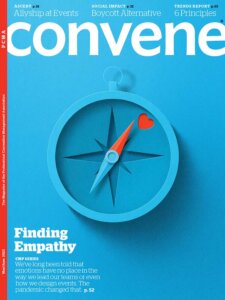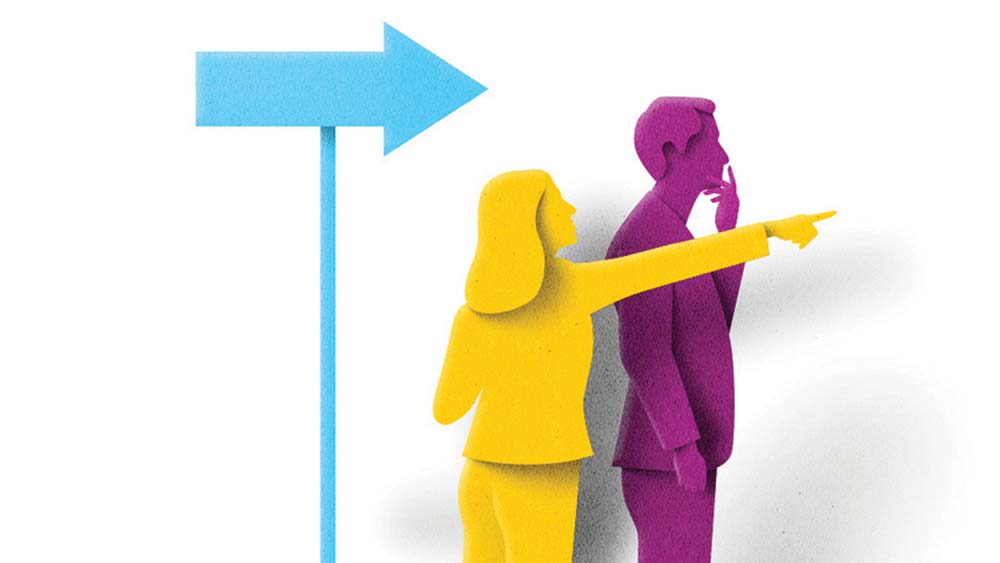Carolyn Dolezal first encountered the power of empathy — although she didn’t call it that at the time — while working as a young manager in the banking industry. It was during a period of explosive growth that was “a little bit scary,” said Dolezal, who is now chief operating officer for ASUG-Americas’ SAP Users’ Group. She noticed that “when people get scared, they tend to shut down or get narrower. And when they’re less scared, they tend to open up a bit more,” Dolezal told Convene. When she connected with her team to try to understand and address areas where they felt unsure or needed help, Dolezal found that “we could then focus more on the work and less on fear.”

These stories are part of our May/June cover and CMP Series story package. Find the print facsimile edition here.
It was a discovery that served Dolezal through numerous executive roles, including as executive vice president and chief executive, technology industry practice, at SmithBucklin, and as CEO of C200, a women’s business leadership organization, in addition to founding executive coaching and consulting practices. But it was during the pandemic that she became aware of just how powerful a management and leadership tool empathy is, she said. “Empathy had been discounted or maybe even dismissed by many as a soft skill. And we were learning in remote work and in distributed teams — and with a lot of uncertainty going on in the world — that empathy was actually a superpower.”
Among corporate and entrepreneurial women at C200, all c-suite executives, the conversations were all about how to connect with employees, she said. During the global crisis, the executives realized that the only way they could take care of their teams was to “find out what was on their minds,” Dolezal said, “and taking that input and modifying workplace procedures and practices to accommodate what people need and still deliver great business results.”
Using empathy as a framework was also a “powerful propellant” in helping her and her team connect with members, when the pandemic prevented C200 from holding its annual meeting — “the thing the members love the most” — in person, Dolezal said. “We’re humans, we’re seeking connection, but how can you connect when you can’t gather in the same place?”

‘We were learning that empathy
is actually a superpower.’ — Carolyn Dalezal
Dolezal and her team worked with Storycraft Lab, founded by Naomi Clare Crellin, a proponent of human-centered design. C200 invited members to help make the C200 online meeting as engaging and meaningful as possible to them personally, using a process Dolezal described as “an act of co-creation. It resulted in an event that was designed based on ways participants said they like to learn and absorb information and have peer conversations,” she said. “It not only gave us a great event, but it became an event that members wanted to attend.” (See “Giving Meeting and Event Participants a Voice.”)
It’s not news, Dolezal added. “The fundamental 101 of excellent customer service is that you really try to understand who you are working for, what you’re trying to provide, and why they should care. And unless you understand the recipient, it’s very difficult for you to provide something that’s on point for them.”
Dolezal, who began working for ASUG in August 2022, is working again with Storycraft Lab to design events for that community. And they have another collaboration — Dolezal and Crellin are co-authors of “The Future of Empathy,” a paper that offers a blueprint for developing empathy as a strategic skill, both personally and within organizations, that combines the authors’ expertise in leadership and management development with human-centered and experiential design.
“The golden rule is: ‘Do unto others as you would have them do unto you,’” Dolezal told Convene. But “empathy is actually, ‘Do unto others as they would have you do unto them.’” Empathy is three-dimensional, she added. “It’s not just top-down. It’s also peer-to-peer and bottom-up in organizations. Empathy is everybody’s responsibility.”
ON THE WEB
Download the paper “The Future of Empathy,” by Naomi Clare Crellin and Carolyn Dolezal.
Empathy Goes Mainstream
“We stand on the cusp of organizations integrating empathy into the mainstream of their practice; this is the immediate future,” write Naomi Clare Crellin and Carolyn Dolezal, in “The Future of Empathy,” a paper published last year. Here are some excerpts:
“At its core, empathy is the ability to recognize the emotions of others and to acknowledge their perspective. Empathy contributes to business success by cultivating a community where workers feel valued and inspired; employees met with empathy have a clearer understanding of company goals and how their contributions work together to achieve success.”
“Empathy can also be practiced with customers to learn their fundamental attitudes and opinions. This goes beyond just addressing requests or demands — it involves considering the overall experience from the consumer point of view.”
“Leading a team is no longer about power; it’s about empowering and supporting others to be the best they can be. Mastering the balance of empathy is an essential quality of a good leader, but it takes practice to know when to stand firm and when to make concessions. It starts with open communication, vulnerability, and empathy.”
Barbara Palmer is senior editor of Convene. Top illustration by Eiko Ojala.

